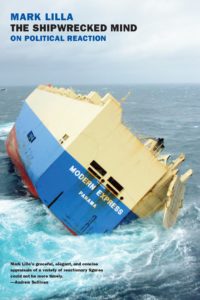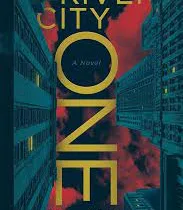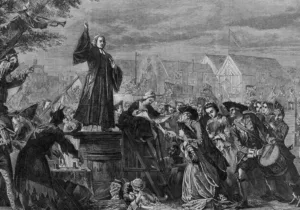This book review of Mark Lilla’s The Shipwrecked Mind: On Political Reaction first appeared in the Winter 2017 issue of Providence‘s print edition. To read the original in a PDF format, click here. To receive complete future issues of the journal once they are published, you can subscribe for only $28 a year.
In the Woody Allen film Midnight in Paris, the main character, Gil Pender, travels back in time to 1920s Paris to mingle and chat with figures he idolizes—Jean Cocteau, Pablo Picasso, Cole Porter, F. Scott and Zelda Fitzgerald, Ernest Hemingway, Gertrude Stein, and on and on. Gil idolizes this period as the Golden Age of high Parisian artistic creativity and cultural achievement. During one of his forays, he meets and falls in love with Adriana, a lover of Pablo Picasso. They end up traveling further back to Paris circa 1890, the Belle Époque period of Gauguin and Degas, which Adriana considers the true Golden Age of Paris. She attempts to convince Gil to stay with her there; however, Gil at this point comes to a realization about nostalgia, both Adriana’s and his own: it is just a seductive form of escapism. He decides to return to the present rather than live in the past.
 Mark Lilla has discovered what Gil Pender discovered. His new book The Shipwrecked Mind: On Political Reaction, examines the power of nostalgia in its political manifestation. In his previous, staunchly future-oriented book The Reckless Mind: Intellectuals in Politics, Lilla examined the roots of radicalism in contemporary politics. In this latest book, he sets out in the opposite and uncharted direction to examine the role of the reactionary mind, which is oriented towards the past, or in his phrase “stuck in the past”. The book focuses more on conservative figures since conservatives have a stronger propensity to yearn for the lost Eden of some Golden Age from which we have fallen. This is also true of American Christians, who pine for the good ole’ days before the 1960s inaugurated the fall into godless hedonism and secularism. But unlike conservatism, Lilla’s reactionary is similar to the radical in that they are both driven by a form of utopianism: “The militancy of his nostalgia is what makes the reactionary a distinctly modern figure, not a traditional one” (xiii). The power of nostalgia is that it is rooted in the past and not in a future utopia that can fail to materialize. “Hopes can be disappointed,” Lilla avers, “Nostalgia is irrefutable” (xiv).
Mark Lilla has discovered what Gil Pender discovered. His new book The Shipwrecked Mind: On Political Reaction, examines the power of nostalgia in its political manifestation. In his previous, staunchly future-oriented book The Reckless Mind: Intellectuals in Politics, Lilla examined the roots of radicalism in contemporary politics. In this latest book, he sets out in the opposite and uncharted direction to examine the role of the reactionary mind, which is oriented towards the past, or in his phrase “stuck in the past”. The book focuses more on conservative figures since conservatives have a stronger propensity to yearn for the lost Eden of some Golden Age from which we have fallen. This is also true of American Christians, who pine for the good ole’ days before the 1960s inaugurated the fall into godless hedonism and secularism. But unlike conservatism, Lilla’s reactionary is similar to the radical in that they are both driven by a form of utopianism: “The militancy of his nostalgia is what makes the reactionary a distinctly modern figure, not a traditional one” (xiii). The power of nostalgia is that it is rooted in the past and not in a future utopia that can fail to materialize. “Hopes can be disappointed,” Lilla avers, “Nostalgia is irrefutable” (xiv).
Interestingly, it is the Germans who dominate the book’s narrative. Opening chapters on Franz Rosenzweig, Eric Voegelin, and Leo Strauss sketch the influences and mindset of the reactionary. Each thinker is critical of modernity, and two of them were directly affected by Nazi Germany. There is a similarity to their diagnosis of the present sickness in the West. “Healthy” thinking at some point devolves into sick thinking or deviation from the healthy whereby the “new thinking” initiates a decline leading to the present rot. What each intellectual purports to offer is a therapy that will return thinking to a state of health.
Lilla then moves to two contemporary figures, Jacob Taubes and Brad Gregory, who serve as modern examples. Taubes and Gregory exemplify reactionary thinking on the left and right. Gregory’s narrative is more interesting because it touches on Catholic anti-modernism that has been in ascendant in many contemporary intellectual circles. Lilla largely dismisses this narrative as a “just so story”, and I am inclined to agree. In it the late medieval world is described in glowing tones as a wondrous world of harmony and order only to be rent asunder by the Protestant Reformers and the Radical Reformation.
Shipwrecked Mind is an impressive little book that packs a punch or two; the most important of which is how Lilla opens “reactionary” as a fruitful category to understand our current moment both in America and around the world. One cannot help but see Donald Trump’s rise and his politics illumined, in part, by this reactionary impulse for long lost days of prosperity before globalism’s rise and its depredations. The new category also explains how Trump’s politics often run counter to conservative politics, even if they find their home in the current Republican Party. Of contemporary relevance, if we grant Lilla his narrative, it is noteworthy that the reactionaries he describes have a much more moderate effect on politics than their radical brethren, whose utopianism is more susceptible to ideological tyranny and destruction.
As would be expected, reactionaries, rooted in nostalgia, are not well-reconciled to modernity or the fruits of modernity. While Lilla functions on the assumption that not being reconciled to modernity is a problem, he gives little in way of explaining why. Perhaps he wants one to accept all that modernity is and has wrought simply, thereby, to avoid becoming reactionary? Indeed, one gets the impression that Lilla, at a minimum, defaults to this assumption; though the efficacy of the proposal seems quite questionable in itself.
As with all critical narratives that offer no alternative except the unmasking of “false” narratives, Shipwrecked Mind leaves one feeling a bit unsatisfied. Nevertheless, the power of this little book to unlock Gil Pender’s insight into nostalgia—that we all long to return to a Golden Age, to a paradise lost—is timely and sheds much light on our present situation. It offers an important caution to those who are intoxicated by the desire to remake the Garden of Eden in our contemporary world. There was only ever one garden, and we cannot return to it. While I do not share the opinion that things are getting better all the time, I do not think that being hopelessly nostalgic for the days of low rates of divorce and out of wedlock births is the solution. It is an illusion that we would be happier if we just lived in a better time or place. If we look back, it should be to the one event that truly changed all of history; and if we look forward, we should look forward to the coming of a renewed reality that shall not be brought about by human design or will.
—
Daniel Strand is a postdoctoral fellow in the Center for Political Thought and Leadership at Arizona State University. His scholarly interests are in history of political thought, religion and politics, and St. Augustine of Hippo.
Photo Credit: By Marina S, via Flickr.







 Live in the DC area? Sign-up for Providence's in-person events list!
Live in the DC area? Sign-up for Providence's in-person events list!